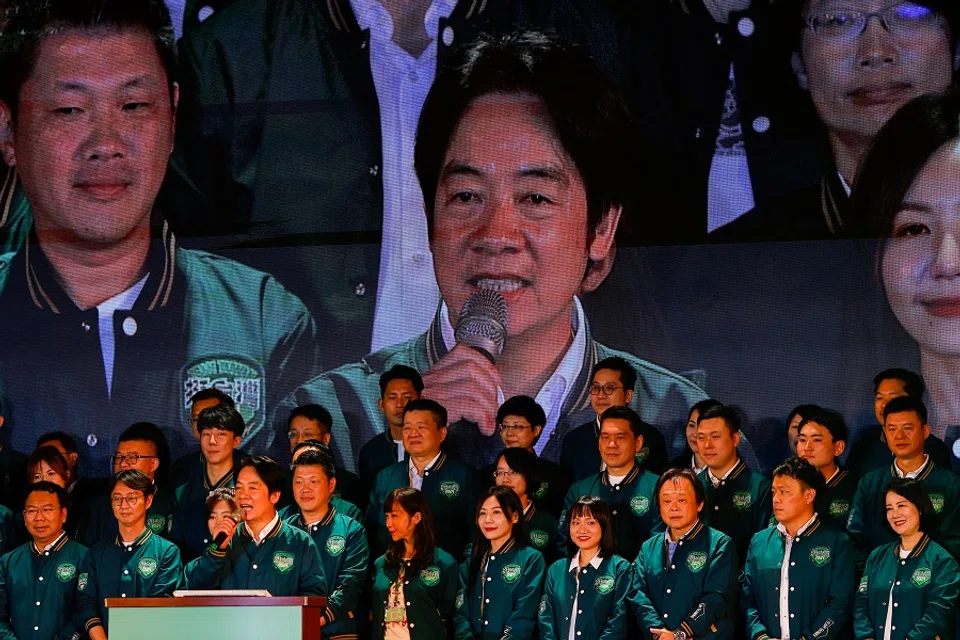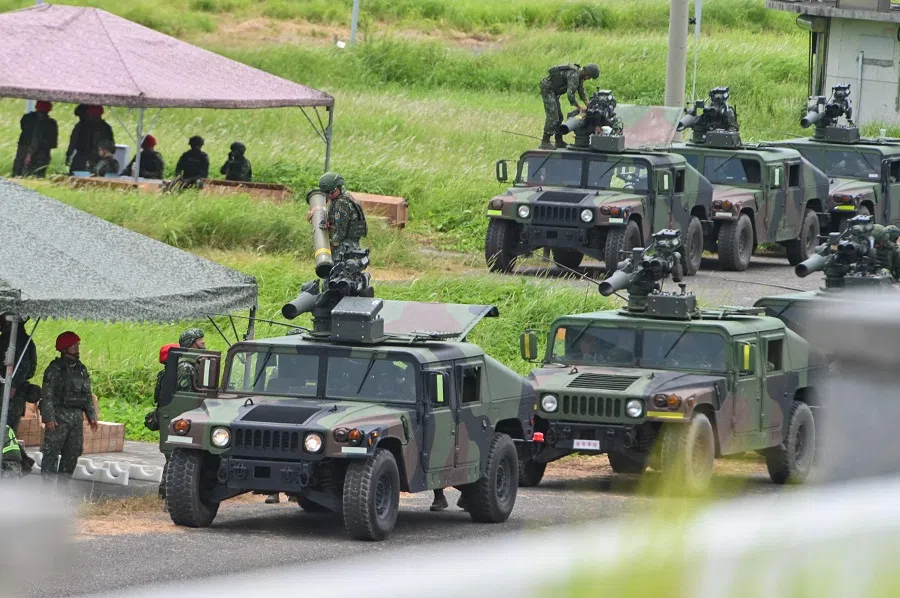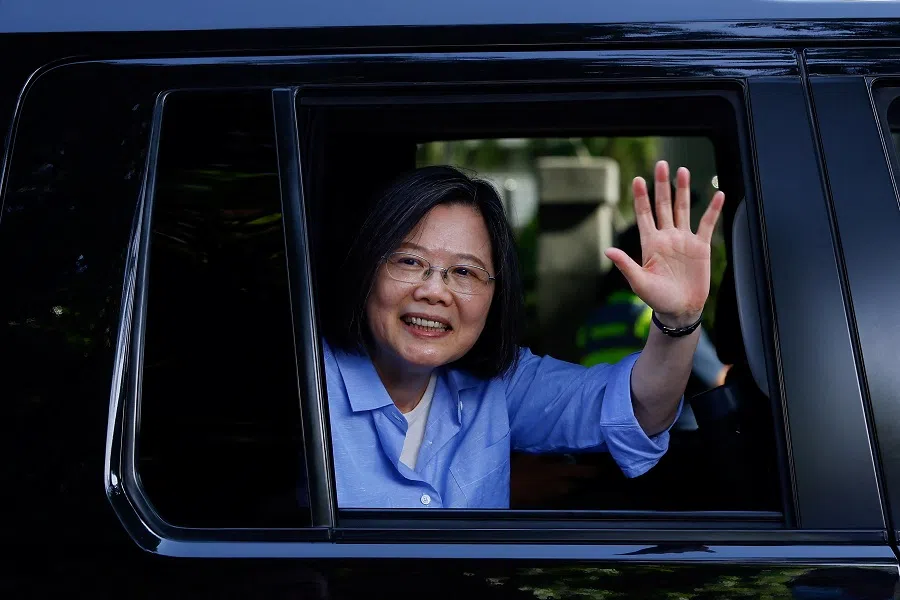Taiwan Vice-President William Lai's upcoming transit in the US draws ire
Taiwan Vice-President and Democratic Progressive Party presidential candidate William Lai is expected to transit in the US enroute to Paraguay to attend President-elect Santiago Peña's inauguration in August. US officials are adopting a "low-key" handling of the transit amid Chinese foreign ministry protests. Lianhe Zaobao journalist Chuang Hui Liang has the details.

Taiwan's presidential office announced on 17 July that Taiwan President Tsai Ing-wen has appointed Vice-President William Lai Ching-te as her special envoy to attend the inauguration of President-elect Santiago Peña in Paraguay. In response, mainland China lodged serious representations with the US, asserting that it will take resolute and strong measures to safeguard its sovereignty and territorial integrity.
Academics interviewed for this report said that amid an easing of US-China relations, a transit stop in the US by Lai, the Democratic Progressive Party's 2024 presidential candidate, would be particularly sensitive. The US has little choice but to handle the matter in a low-profile manner.
Taiwan Vice-Minister of Foreign Affairs Alexander Tah-ray Yui said at the press conference that Tsai had appointed Lai as her envoy to attend Peña's inauguration and activities for the 486th anniversary of the founding of Asunción, Paraguay's capital. The Taiwan delegation will arrive in Paraguay on 14 August to attend the inauguration ceremony on 15 August.
A low-key transit expected
Taiwan media reported that the US hopes that Lai will keep it low-key when he makes his transit and even requested that he only hold one private event. Taiwan Representative to the US Hsiao Bi-khim tried to mediate the situation to little effect.

Yui noted that Taiwanese presidents and vice-presidents had transited in the US enroute to Central and South America previously, and Lai's transit will be handled with the principles of comfort, convenience, safety and dignity; being low-key was a factor mentioned by others, not them.
He emphasised that Taiwanese vice-presidents had made transit stops in the US ten times prior. This would be the 11th time and done in accordance with the usual practice. Thus, there should be nothing for the mainland to be upset about.
... it would be particularly sensitive for Lai to be transiting in the US, hence the low-profile handling by the US.
Mainland China's foreign ministry spokesperson Mao Ning said at a regular press conference on 17 July that the mainland "firmly opposes any form of official interaction between the US and the Taiwan region" and has "lodged serious representations with the US side".
Mao added that the mainland "firmly opposes any visit by 'Taiwan independence' separatists to the US in any name or under whatever pretext, and firmly opposes the US's conniving with and supporting the 'Taiwan independence' separatists and their separatist activities in any form".

She reiterated that the "Taiwan question is the very core of China's core interests and the first red line that must not be crossed in the China-US relations" and urged the US to "abide by the one-China principle and the three China-US joint communiqués, act on its leaders' commitment including not supporting 'Taiwan independence', stop official interaction with Taiwan, [and] stop upgrading its substantive exchanges with the region".
A sensitive time in US-China relations
Yen Chen-shen, a research fellow at National Chengchi University's Institute of International Relations told Lianhe Zaobao that just when US-China relations are easing and US President Joe Biden has hopes of meeting Chinese President Xi Jinping at the G20 and APEC summits later in the year, it would be particularly sensitive for Lai to be transiting in the US, hence the low-profile handling by the US.
Yen said that Lai is only able to transit in the US to visit a diplomatic ally as a special envoy because he is the vice president; it is also precisely because of this that he cannot enter Washington DC.
"The US still has its reservations about William Lai's strong advocacy for 'Taiwan independence' in the past. When Tsai Ing-wen visited the US in 2012, her trip had not ended well because the US did not trust her cross-strait policy, which was later amended to maintain the status quo. But Lai has yet to amend his position and even recently made an inappropriate comment about elected leaders of Taiwan being able to enter the White House. This time, he may not even be allowed to go anywhere near the Washington DC area," Yen said.

Earlier when Lai received the delegation led by National Endowment for Democracy (NED) President Damon Wilson, he expressed his hope that the NED would continue to support Taiwan amid the threat of regional hegemony, and that international society would also pay more attention to Taiwan to jointly safeguard peace and stability in the Indo-Pacific region.
Also, Lai hosted a dinner banquet for Akie Abe, the widow of former Japanese Prime Minister Shinzo Abe, at the Grand Hotel in Taipei when she arrived in Taiwan on 17 July.
The presidential press release said that Lai expressed his affection for Shinzo Abe on behalf of Tsai and the people of Taiwan, affirming that Abe was not only a Japanese statesman who contributed to the peace and stability of Japan and the Indo-Pacific region, but was also a very warm person.
This article was first published in Lianhe Zaobao as "赖清德8月过境美国赴巴拉圭 北京向华府提严正交涉".



![[Big read] When the Arctic opens, what happens to Singapore?](https://cassette.sphdigital.com.sg/image/thinkchina/da65edebca34645c711c55e83e9877109b3c53847ebb1305573974651df1d13a)
![[Video] George Yeo: America’s deep pain — and why China won’t colonise](https://cassette.sphdigital.com.sg/image/thinkchina/15083e45d96c12390bdea6af2daf19fd9fcd875aa44a0f92796f34e3dad561cc)
